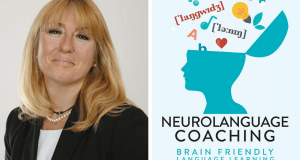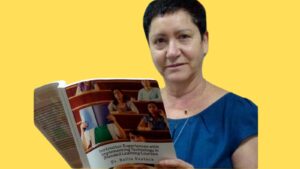Phil Wade Interviews: Scott Thornbury
Scott Thornbury teaches on the MA TESOL program at The New School in New York. His previous experience includes teaching and teacher training in Egypt, UK, Spain, and in his native New Zealand. Scott’s writing credits include several award-winning books for teachers on language and methodology. His most recent book is Scott Thornbury’s 30 Language Teaching Methods, to be published next year by Cambridge. He is series editor for the Cambridge Handbooks for Language Teachers. His website is www.scottthornbury.com .
1) One of your current interests is Embodied Learning. I know that it’s been used for some time in primary education so how can it be employed with teens and adults?
Put simply, embodied learning claims that cognition extends beyond the physical brain, and hence learning (which is a form of cognition) implicates not only the brain but the physical body and the way that the body interacts with its environment, e.g. through the use of gesture. As you say, gesture has been used successfully in, above all, teaching basic numeracy skills at primary level by, for example, having children relate the components of arithmetical sums to specific gestures.
The idea has been extended into language teaching, e.g., relating gestures to phrasal verb particles (up, out, off, etc) and physical movement has been shown to enhance understanding and recall. A French academic called Jean-Remí Lapaire has developed a whole methodology using gesture for the teaching of English grammar – his YouTube videos are well worth watching. I hasten to add that this is not meant to vindicate the idea that some learners are ‘kinaesthetic’. On the contrary, it argues that all learning is, at least in part, kinaesthetic – in the sense that cognition is embodied, and that we ‘think with our hands’.
Total Physical Response and Situational Language Teaching
2) You are also looking into usage-based approaches to language learning which argue that we develop meaning from utilising language. How would you justify this approach, especially to teachers generally accustomed to just explaining language points and proving structured practice tasks?
Yes, proponents of a usage-based view argue that language learning involves general cognitive operations that are activated, refined, and entrenched through participation in communicative interaction – and hence reject the idea that the language learning is an innate, genetically-specified and language-specific faculty – á la Chomsky. To me, this would seem to validate what we call the communicative approach, i.e. the idea that you learn to communicate by communicating. This doesn’t exclude the possibility that more mechanical, form-focused activities are helpful, but suggests that without the experience of participating in real communication, the effects of language learning remain ‘disactivated’ and inert.
John F. Faneslow Interview with Alexandra Chistyakova
3) I read that you are a big fan of language evolution so I am sure you have noticed these ‘Trumpisms’ like ‘bigly’. From an evolutionary angle, should we be embracing such changes or being more prescriptive in the classroom?
Language evolves and changes as we speak. In fact, every time we speak, we contribute to this evolution in microscopic ways. A grammar or a dictionary is simply a snapshot of language at any one time and in any one place – and a fairly fuzzy snapshot at that. As teachers of language we need to be alert to the way language changes, and we need to sensitise learners to the fact that, apart from anything else, rules are to be broken.
4) I must ask you about Dogme as it has been a major influence on my own teaching and that of many PLN friends but it seems to have vanished now. Has it finally run its course or has it been absorbed into mainstream TEFL so much it it isn’t alternative anymore?
I don’t actually think that Dogme has vanished – on the contrary, it gets many more mentions than it used to in books on methodology, for example – suggesting it has found its ‘niche’ in the diversity of pedagogical options available. But it’s true that it doesn’t make news any more, since its shock value has evaporated – unsurprisingly given that it was first propounded nearly 20 years ago. But it is still a favoured option on Diploma courses, for example, where trainees are required to do ‘experimental practice’.
Teaching Adult ESL – Some Tips
5) Given the huge popularity of edtech and sometimes serious phone addiction by students, is it the right time for a new form of Dogme that is mobile device light?
I am currently reading a book called ‘Reclaiming Conversation: The power of talk in a digital age’ by Sherry Turkel. She makes a powerful argument for banning mobile devices from homes, workplaces and, above all, classrooms, and restoring face-to-face conversation to its rightful place as the best means both for creating social cohesion and for constructing knowledge. She insists that her argument is ‘not anti-technology. Its pro-conversation.’ That’s what we used to say about Dogme, too.
6) As a writer, presenter, teacher, teacher trainer and inspiration to countless new and existing teachers, what would you say are the 3 key factors to becoming a GOOD teacher?
I really don’t think there’s any great mystery to what constitutes good teaching: clearly, it helps a lot if you know your subject, but you also have to know when and how to ‘withhold’ this knowledge in order that the learners can discover it for themselves. And you have to know how to motivate them to want to do this. Is that three things?
7) You are an extremely valued and respected leader of the TEFL community and I would go so far as to say to many of us you are the godfather of TEFL, but what do you have left to accomplish as you’ve done everything possible almost?
(‘Godfather’ has a slightly sinister ring to it!) As for accomplishments, I am proud of the fact that – just yesterday – I gave a webinar in Spanish (twice) to over 500 participants around the world, and that experience has motivated me to work on improving my ‘professional’ Spanish so as to be able to do this with more confidence, more fluently and more accurately. That’s my current project.
8) I know that you read a lot of books and articles on TEFL but which non-typical book or article would you recommend every new teacher reads and why?
I think you can’t do much better than read John Holt’s classic ‘How Children Fail’ (first published in 1964) and its sequel ‘How Children Learn’ (1967). A taster (from the latter): ‘It can’t be said too often: we get better at using words, whether hearing, speaking, reading, or writing, under one condition and only one – when we use those words to say something we want to say, to people we want to say it to, for purposes that are our own’.







